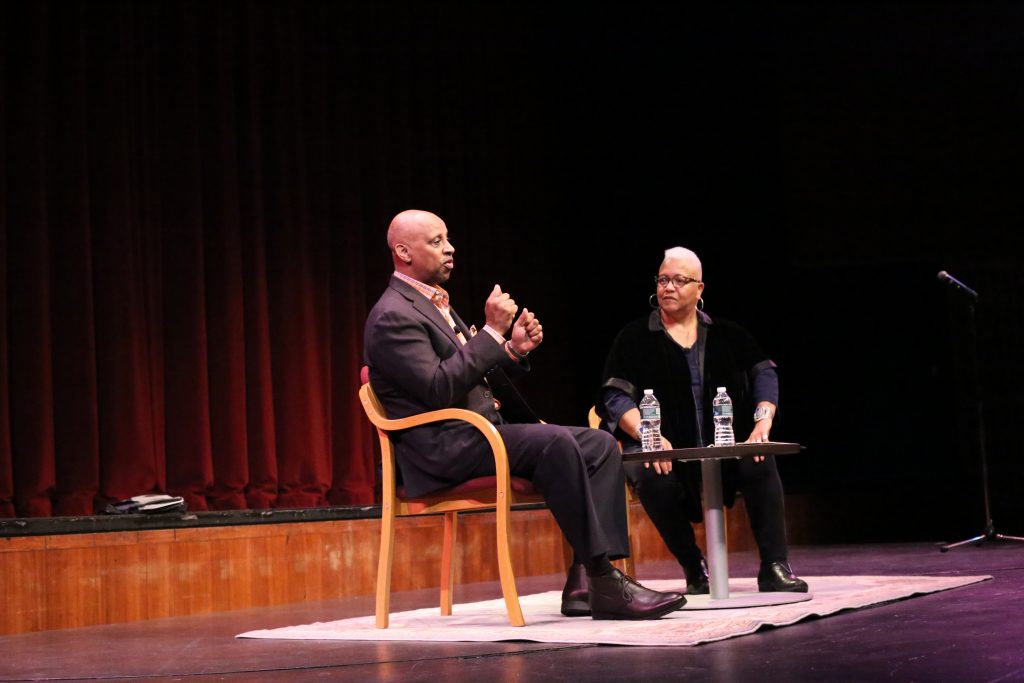In a guided conversation with an audience of students and community members on Wednesday, Elizabeth Chilton, dean of Harpur College, Sharon Ball, former executive director of the Broome County Arts Council and alumnus, playwright, director and actor Ruben Santiago-Hudson, discussed Santiago-Hudson’s time at Binghamton University, navigating life and portrayals of minorities — particularly African Americans — in the media and entertainment industry.
Born in Lackawanna, New York, south of Buffalo, Santiago-Hudson discussed his upbringing and how it inspired his play, “Lackawanna Blues.” He said he sought to portray black characters as complex, multifaceted, relatable and completely human.
“There is a demand for cohesiveness in America, to find a way to bridge this gap between people,” Santiago-Hudson said. “We’ve always had our stereotypes, racism and prejudices. Now there’s this demand to know about each other. It’s a curiosity that becomes a love. They discover themselves in these plays even if they’ve never met a black person before or rode in a Jitney or eaten at a black restaurant.”
Shortly after, the conversation shifted from black characters to finding one’s path in the entertainment industry as a minority.
“Theater owners and directors will come across seats to shake my hand and say ‘Hey, it’s good to see you,’” Santiago-Hudson said. “In the back of my mind, I think, ‘I’ve had 15 meetings with you about putting a black play in one of your theaters.’ I have to take that thing that intimidates them off of them for a second and the thing that intimidates them is my passion for my people and my stories and my necessity to tell them.”
Santiago-Hudson’s remarks were met with widespread applause from the audience. Santiago-Hudson spoke passionately about his love of theatre and how it has helped him define his own identity.
“To be quite honest with you, I was just another brother that didn’t matter in the world,” Santiago-Hudson said. “All of a sudden, when I got on stage, people would clap, and I felt like I mattered. I matter because of this art.”
Santiago-Hudson discussed his personal experience, heritage and creative process in a way that spoke to many in attendance. Mayah Wells, a senior majoring in theatre, emphasized the impact of his words.
“Ruben is an amazing man,” Wells said. “The words he speaks are so powerful and so full of advice and humor and stories. He brings out the talent in you that you never knew you had.”
Having taken a class with Santiago-Hudson over the previous summer, Wells reflected on her one-on-one experience with the playwright and how it altered her perspective on life.
“The program changed me forever,” she said. “He made me feel so much more confident about myself. I’m learning more about my culture and history as a black woman. Over the summer, almost every day we were crying tears of joy and emotion. All of us left as completely new, reformed people.”
According to Wells, Santiago-Hudson is particularly an inspiration to students of color, having found success in a field that has long ignored the contributions of minorities.
“He showed black people who don’t think they’re good enough that they can be good enough,” Wells said. “People that rejected them, he shows them that it’s possible to come back and say, ‘Yes, I can do that actually, so thank you for not believing in me because I just showed you that you’re wrong.’”
The discussion was held in conjunction with “not but nothing other: African-American Portrayals, 1930s to Today,” an exhibition in the BU Art Museum. After the discussion, a reception was held in the museum where guests and the audience were able to mingle, eat and observe the artwork on display. The exhibition will be on display until Dec. 7.



